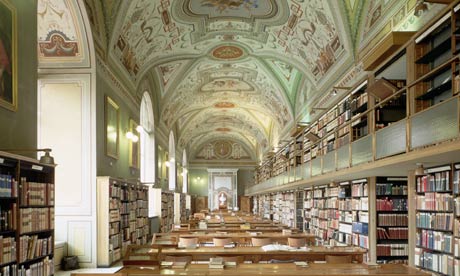Greek manuscripts and earliest surviving Hebrew codex among 1.5m pages to be digitised for both scholars and public to peruse


The Vatican library will provide two-thirds of the material for the joint online venture with Oxford University's Bodleian library. Photograph: Massimo Listri/Corbis
Six centuries after it was founded by Pope Nicholas V for "the common convenience of the learned", the treasures of the Vatican library are to become accessible to scholars and the public alike via the internet.
Greek manuscripts of works by Homer and Plato, perhaps the earliest Hebrew codex in existence and scores of early printed Italian books are among thousands of texts that will be made freely available online by theBiblioteca Apostolica Vaticana (BAV) and Oxford University's Bodleian library.
Over the next four years, the two institutions plan to digitise 1.5m pages from their collections and in doing so reunite texts that have been dispersed for centuries.
The joint project, funded by a £2m grant from the Polonsky charitable foundation, will allow academic researchers and the public to pore over documents from the comfort of their own desks and sofas.
Two-thirds of the material will come from the Vatican library, which was founded in 1451, and which houses more than 1.6m printed books and 180,000 manuscripts.
The remaining pages will come from the Bodleian, which was opened a 151 years later, and which now holds more than 11m printed items.
The digitised collections will fall into three groups: Greek manuscripts; 15th-century printed books (or incunabula), and Hebrew manuscripts and early printed books. The university said the categories had been chosen "for the strength of the collections in both libraries and their importance for scholarship in their respective fields".
Among the other texts to be digitised and put online are works by Sophocles and Hippocrates, a copy of the entire bible written in Italyaround 1100, and volumes of biblical, Kabbalah and Talmudic commentary.
Sarah Thomas, Bodley's Librarian, said the project would help "transcend the limitations of time and space" that had stymied academic research in the past".
She added: "Scholars will be able to interrogate these documents in fresh approaches as a result of their online availability. Today's world – and tomorrow's – is one of global connectedness."
Monsignor Cesare Pasini, the prefect of the BAV, described the collaboration as "a great step forward in the Vatican library's entry into the digital age", adding: "With this joint initiative, the two libraries continue to accomplish their mission for the benefit of science and culture; it represents a great step forward in the Vatican library's entry into the digital age."
Dr Leonard Polonsky, whose eponymous foundation has supported previous efforts to digitise the Bodleian, said the grant would make important collections available to scholars and members of the public all over the world.
He added: "Twenty-first century technology provides the opportunity for collaborations between cultural institutions in the way they manage, disseminate and make available for research the information, knowledge and expertise they hold."
No comments:
Post a Comment